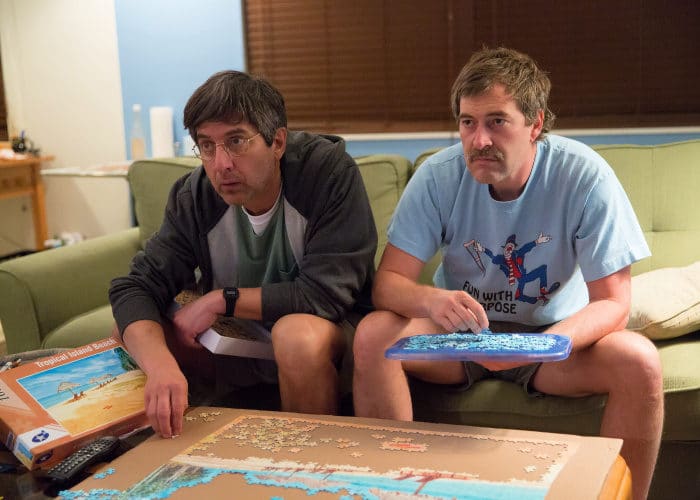Steven Spielberg may be upset about Netflix movies winning big at the Oscars, but if it weren’t for streaming, how would audiences in India ever get to watch a film like Paddleton? A small indie centring two social misfits who share such a heart-warming friendship that one of them is willing to help the other die with dignity, isn’t likely to get a four-week theatrical run anywhere on the planet. And yet, it deserves to be seen. So thank goodness for Netflix!
Directed by Alex Lehmann, Paddleton derives its title from the game Andy (Ray Romano) and Michael (co-writer Mark Duplass) have devised for themselves. It involves hitting a pink rubber ball at a wall and having it bounce back into a barrel placed behind them. Unlike most competitive sports, they aren’t playing against each other, but are simply trying to get the ball into the barrel. Nobody keeps score, no one wins or loses—the only purpose of playing the game is for its own sake.
Even before the opening credits we know that Michael is terminally ill. Andy is by his side at the hospital and wants the doctor to tell them the truth. When she asks him how the two men are related, he replies with a deadpan expression (and this is classic Romano), “We’re neighbors. I live on top of him.” He literally does live above Michael. But apart from that, they function more like roommates. Michael cooks pizza for dinner, they play trivial pursuit, solve intricate jigsaw puzzles and watch the same Kung Fu movie called Death Punch over and over again (an original piece made for the film that fits in nicely).
It’s remarkable how readily Andy and Michael accept their ordinariness and remain largely undisturbed by the pleasures or pressures of modern living. Here are two blokes who dress in the most non-descript manner possible, live in sparse homes, hold monotonous jobs, and play an invented game at a deserted drive-in cinema. They’re socially awkward (Andy is flummoxed when a new girl at work asks him how his weekend was) and don’t seem to have family ties besides a passing mention of Michael’s sister. Yet none of this weighs them down.
When Michael decides to end his life at home (some states in the US allow assisted suicide for the terminally ill) and asks Andy to help him out, there’s no fuss about that either. Yes, his friend is distressed and he tries to talk him out of it. But when he realises Michael is determined, he agrees to go along. They take a road trip to procure the medicines and later, try to continue with their pizza-puzzle-movie routine as much as possible.
You see Andy’s anguish as he worries each time Michael falls into a deep sleep or retches in the bathroom. He understands the burden of being ‘the other guy’ to Michael’s ‘dying guy’ but despite the emotional toll, he sticks it out till the end. Michael makes an interesting contrast to Hrishikesh Mukherjee’s Anand with its eponymous protagonist who too has just a few months to live and spends them by spreading joy amongst his friends, notably the careworn doctor Bhaskar aka ‘Babumoshai’. The difference is, unlike Anand, who insists of being maddeningly cheerful at all times and exhorting his friends to do so even when they can’t, Michael understands when Andy tells him he can’t just be ‘normal’ in the face of this crisis.
Michael’s clear-sighted decision also brings to mind the struggle and existential conflict the monk in Ship Of Theseus goes through. For all his convictions and principles which propel him to walk barefoot for hours to get to court and take on big pharma companies for conducting animal trials, to live frugally while contemplating grand philosophical questions in a bustling metropolis, the monk is unable to let go of life and accepts his failure by giving in to the very medical system he’s been fighting for years. Perhaps Michael knows his situation is without hope, while the monk has a way out through organ transplant. Or maybe Michael just accepts death as unfussily as he lives…
Paddleton is vintage Duplass—funny, poignant, thought-provoking. The dialogue always flows naturally and the acting is so brilliant it almost obscures the artifice of cinema. It is life affirming in its emphasis on dying well. Putting two average Joes at its centre and celebrating their simplicity throws up the question of what a ‘good life’ really means. Above all, it demonstrates the value of friendship and the virtues of stoicism without underlining either.
English, Drama, Color


